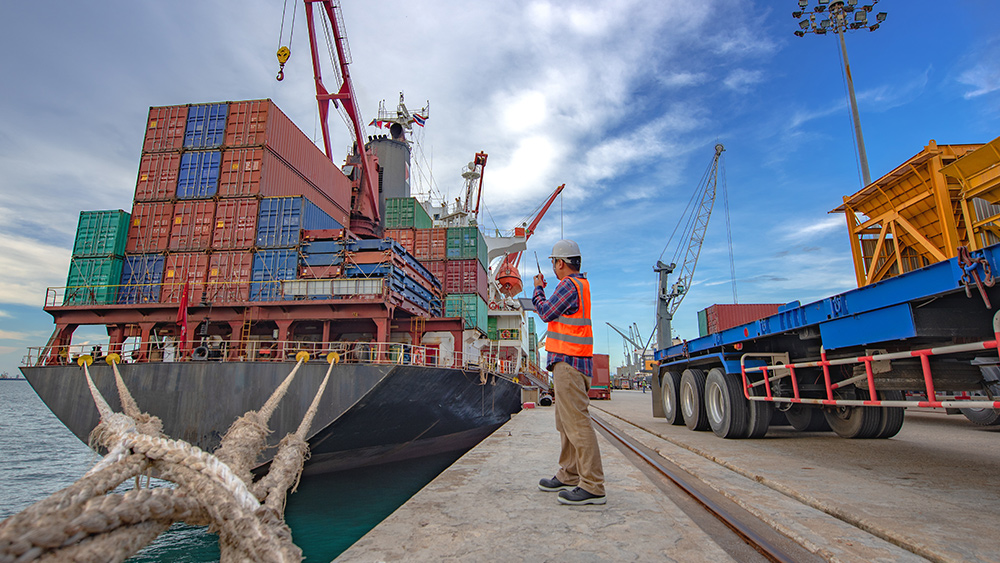Major supply chain disruptions expected as half of American ocean shipping grinds to a halt due to dockworkers’ strike
10/02/2024 / By Cassie B.

The first widescale stoppage in U.S. ocean shipping in half a century is currently underway as dock workers on the East Coast and Gulf Coast started a strike on Tuesday following a breakdown in new labor contract negotiations.
The affected ports are responsible for half of all American imports and billions of dollars in monthly trade, in addition to serving as vital hubs for American exports. The strike will impact shipments of everything from food to vehicles, and its effects could be far-reaching. Some analysts predict it could cost the American economy billions of dollars per day, contribute to inflation, and put jobs at risk.
The potential disruption is so dramatic that the National Retail Federation has called on the Biden administration to use its federal authority to stop the strike or the economy could suffer “devastating consequences.”
Officials have said, however, that they will not take advantage of the Taft-Hartley Act to intervene and force an 80-day cooling off period during which workers must return to work and negotiations would resume.
The strike impacts 36 ports from Maine to Texas, including major ports in Baltimore, New York and Houston.
At the heart of the dispute is wages, with the International Longshoremen’s Association Union rejecting a final proposal from the United States Maritime Alliance employer group involving a six-year contract. The union, which represents 45,000 port workers, felt the offer did not come close to meeting its demands. The USMX said that it was willing to raise wages by almost 50%; the union was seeking a raise of 61.5%.
ILA leader Harold Daggett said that some employers are not offering sufficient pay increases or agreeing to their demands to put an end to port automation projects that could jeopardize their jobs. They were seeking a total ban on automated gates, cranes and trucks that move containers for freight.
He stated: “We are prepared to fight as long as necessary, to stay out on strike for whatever period of time it takes, to get the wages and protections against automation our ILA members deserve.”
Former President Donald Trump is blaming the strike on “the massive inflation that was created by the Harris-Biden regime,” telling Fox News: “Everybody understands the dockworkers because they were decimated by this inflation, just like everybody else in our country and beyond.”
What products will be affected?
Supply chain experts warn that consumers could face product shortages and higher prices as a result of the strike.
One of the foods most likely to be affected is seafood as other transportation options are challenging given its need for refrigeration. Bananas could also be harder to find as 75 percent of the country’s bananas enter through the affected ports. Because they are so perishable, it is not considered economically feasible to ship them on planes.
Wine, beer and other alcohol imported from the Caribbean, Europe, and South America could also be affected.
Electronic goods are another category that will feel the impact, with many of the nation’s cell phones and computers that come from southeast Asian countries rather than China being routed through posts on the East Coast.
Cars and car parts, particularly European ones shipped via container, will also be affected, as will machinery parts and precision instruments.
Holiday shopping could also be affected, especially for small businesses who cannot afford to reroute shipments. Experts have warned that a strike that extends beyond a week could be enough to create goods shortages for the holiday season this year.
Sources for this article include:
Submit a correction >>
Tagged Under:
bubble, chaos, Collapse, economic riot, economy, finance riot, freedom, inflation, Liberty, logistics, market crash, money supply, ocean shipping, products, rationing, Resist, revolt, risk, scarcity, strike, supply chain, uprising
This article may contain statements that reflect the opinion of the author
RECENT NEWS & ARTICLES
COPYRIGHT © 2017 UPRISING NEWS



















